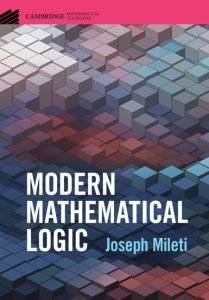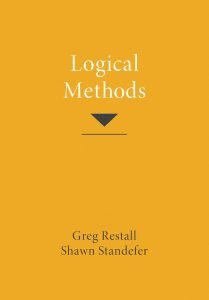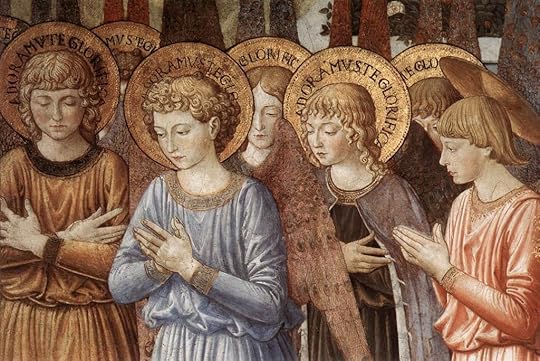Peter Smith's Blog, page 15
December 30, 2023
Music for the end of the year
 Peter Jarusek, Veronika Jaruskova and Boris Giltburg. © Marco Borggreve
Peter Jarusek, Veronika Jaruskova and Boris Giltburg. © Marco BorggreveCD of the year for me has to be the double disc of Dvořák trios by these three! — as I said here, just wonderful. And the great reviews keep coming.
Over the year, I have posted some links to particularly delightful performances available as videos. For example
Here is Beatrice Rana, playing Bach BWV 1052 with the Amsterdam Sinfonietta.More Bach, from the prodigiously gifted Noa Wildschut, plainly enjoying herself performing the E major Violin Concerto, BWV 1042.And here is Elisabeth Brauss and two members of the Halle playing Beethoven’s Gassenhauer Trio, again obviously enjoying themselves.Elisabeth and Noa now play together frequently (recently on a concert tour of Australia); but here they are a few years ago with Alexander Warenberg, playing Schubert’s first piano trio D. 898 — just stunning for players so young.And more Schubert, this time András Schiff playing one of my most favourite pieces, the late Drei Klavierstücke D 946.Then last but not least, a simply joyous performance of the Mendelssohn Octet, by Janine Jansen and some mostly young musicians.Enjoy! And very best for 2024.
The post Music for the end of the year appeared first on Logic Matters.
December 28, 2023
Some logic book notes, 2023
For occasional readers, here are links to some of the perhaps more interesting 2023 posts on logic books here, which you might have missed!
I posted a series of comments on each of two substantial and wide ranging books on mathematical logic. First, Joseph Mileti’s Modern Mathematical Logic (CUP 2023, 502 pp.) is announced as aimed at advanced undergraduates or beginning graduates. Despite the title, the coverage is rather old-school and the approach thoroughly conventional. Mileti starts with basic first-order logic (though there’s no real proof theory). Then there’s a little model theory, entry-level axiomatic set theory, some computability theory, and the book ends with a treatment of incompleteness. But there are, of course, some terrific texts on the separate topics here, and I’m left quite unconvinced that there is any particular virtue in having the whole menu served up between one set of covers. And, though there are some nice sections, I can’t especially recommend Mileti’s presentations of FOL, or of elementary set theory, etc., as compared with some familiar standalone books. For a little more, I’ve wrapped up my various blog posts into single page here.
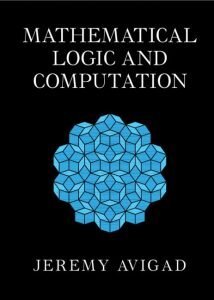 Jeremy Avigad’s Mathematical Logic and Computation (CUP 2023, 513 pp.) is a much more interesting book. In part because — despite Avigad’s intentions and despite the many virtues of the book — this isn’t really a book for beginners. The first seven chapters, some 190 pages, form a book within the book, on core FOL topics but with an unusually and distinctively proof-theoretic flavour. This is very well worth reading, especially if you already know enough (though the exposition is often very brisk, and the amount of motivational chat is variable and sometimes minimal). Then the book moves on to formal arithmetic and computational topics. So, for example, Chapter 9 is the most detailed and accessibly helpful treatment of Primitive Recursive Arithmetic that I know. On the other hand, Ch. 11 on computability is a fast-track introduction to the basics of the theory of partial recursive functions together with a look at Turing machines, and gets to Rice’s theorem in just ten pages, which tells you how very fast things go. I found myself repeatedly remarking on the differences in level/speed (sometimes quite radical) between different chapters, and quite often between sections within a chapter. Does this book in fact have a number of different archaeological layers, with different parts having their ultimate origins in handouts for differently paced, different level courses? I wonder! But if you are prepared for a pretty uneven ride, there is a great deal of highly interesting material here: you’ll just need to be primed to a suitable level (different for different episodes) to really appreciate it. Here’s a page putting together my blog posts on Avigad.
Jeremy Avigad’s Mathematical Logic and Computation (CUP 2023, 513 pp.) is a much more interesting book. In part because — despite Avigad’s intentions and despite the many virtues of the book — this isn’t really a book for beginners. The first seven chapters, some 190 pages, form a book within the book, on core FOL topics but with an unusually and distinctively proof-theoretic flavour. This is very well worth reading, especially if you already know enough (though the exposition is often very brisk, and the amount of motivational chat is variable and sometimes minimal). Then the book moves on to formal arithmetic and computational topics. So, for example, Chapter 9 is the most detailed and accessibly helpful treatment of Primitive Recursive Arithmetic that I know. On the other hand, Ch. 11 on computability is a fast-track introduction to the basics of the theory of partial recursive functions together with a look at Turing machines, and gets to Rice’s theorem in just ten pages, which tells you how very fast things go. I found myself repeatedly remarking on the differences in level/speed (sometimes quite radical) between different chapters, and quite often between sections within a chapter. Does this book in fact have a number of different archaeological layers, with different parts having their ultimate origins in handouts for differently paced, different level courses? I wonder! But if you are prepared for a pretty uneven ride, there is a great deal of highly interesting material here: you’ll just need to be primed to a suitable level (different for different episodes) to really appreciate it. Here’s a page putting together my blog posts on Avigad.
I was (to my surprise) disappointed by Greg Restall and Shawn Standefer’s Logical Methods (MIT, 2023, 270 pp.) The book’s Preface starts “Welcome to Logical Methods, an introduction to logic for philosophy students …”. And the text does indeed seem to start right from scratch. But Restall’s web-page for the book says “The text was developed through years of teaching intermediate (second-year) logic at the University of Melbourne.” While their Amazon blurb says “suitable for undergraduate courses and above.” Which suggests a rather unstable focus. The treatment of propositional logic is heavily skewed towards proof-theoretic methods. There’s one example of a truth-table; but we actually get a full-on, ten-page, proof of normalizability for intuitionistic propositional logic (starting as early as p. 53 in the book). This is in fact very accessibly done. But I honestly can’t imagine too many thinking that this is where they want their beginning philosophy students to be concentrating, so early in their logical encounters! After the chapters on PL, we get a tranche of modal, done before students see a quantifier. Again I can’t imagine too many agreeing that this is the order in which they want their students to meet topics, and the treatment is pretty uneven too. I said a bit more about Logical Methods in these blog posts.
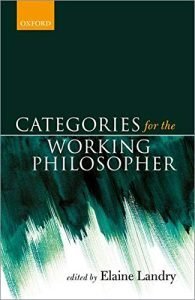 I was late to getting round to reading the papers in the collection Categories for the Working Philosopher edited by Elaine Landry (originally published by OUP in 2017). It is the usual sort of mixed bag, with little sign that the editor had tried to impose a reasonably consistent level of accessibility and philosophical relevance, and some pieces seem quite out of place. There are eighteen papers, of which I was glad to have looked at perhaps half a dozen at most. I confess I started pretty sceptical about claims about the wider significance of category theory (once we go beyond the world of pure mathematics/logic — and perhaps functional programming): and on the evidence of this book, I remain as sceptical. Here, anyway, are my five blog posts on the collection.
I was late to getting round to reading the papers in the collection Categories for the Working Philosopher edited by Elaine Landry (originally published by OUP in 2017). It is the usual sort of mixed bag, with little sign that the editor had tried to impose a reasonably consistent level of accessibility and philosophical relevance, and some pieces seem quite out of place. There are eighteen papers, of which I was glad to have looked at perhaps half a dozen at most. I confess I started pretty sceptical about claims about the wider significance of category theory (once we go beyond the world of pure mathematics/logic — and perhaps functional programming): and on the evidence of this book, I remain as sceptical. Here, anyway, are my five blog posts on the collection.
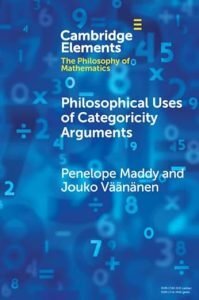 I did enjoy the latest logical addition to the Cambridge Elements series — Penelope Maddy and Jouko Väänänen have written a very interesting contribution on Philosophical Uses of Categoricity Arguments. From their Introduction: “Mathematicians and philosophers have appealed to categoricity arguments in a surprisingly varied range of contexts. One familiar example calls on second-order categoricity in an attempt to show that the Continuum Hypothesis, despite its formal independence, has a determinate truth value, but this doesn’t exhaust the uses of categoricity even in set theory, not to mention its appearance in various roles in discussions of arithmetic. Here, we compare and contrast a sampling of these deployments to get a sense of when these arguments tend to succeed and when they tend to fail. Our story begins with two historical landmarks, Dedekind and Zermelo, on arithmetic and set theory, respectively, and ends with leading contemporary writers, Charles Parsons and the coauthors Tim Button and Sean Walsh, again on arithmetic and set theory, respectively. In between, we pause over the well-known contribution of Georg Kreisel. In each case, we ask: What does the author set out to accomplish, philosophically? What do they actually do (or what can be done), mathematically? And does what’s done (or can be done) accomplish what they set out to do? We find this focus on context illuminating: these authors have qualitatively different philosophical goals, and what works for one might not work for another.” Well worth looking at. If you want a spoiler, a report of Maddy and Väänänen’s score card for their various authors, see this short blog post.
I did enjoy the latest logical addition to the Cambridge Elements series — Penelope Maddy and Jouko Väänänen have written a very interesting contribution on Philosophical Uses of Categoricity Arguments. From their Introduction: “Mathematicians and philosophers have appealed to categoricity arguments in a surprisingly varied range of contexts. One familiar example calls on second-order categoricity in an attempt to show that the Continuum Hypothesis, despite its formal independence, has a determinate truth value, but this doesn’t exhaust the uses of categoricity even in set theory, not to mention its appearance in various roles in discussions of arithmetic. Here, we compare and contrast a sampling of these deployments to get a sense of when these arguments tend to succeed and when they tend to fail. Our story begins with two historical landmarks, Dedekind and Zermelo, on arithmetic and set theory, respectively, and ends with leading contemporary writers, Charles Parsons and the coauthors Tim Button and Sean Walsh, again on arithmetic and set theory, respectively. In between, we pause over the well-known contribution of Georg Kreisel. In each case, we ask: What does the author set out to accomplish, philosophically? What do they actually do (or what can be done), mathematically? And does what’s done (or can be done) accomplish what they set out to do? We find this focus on context illuminating: these authors have qualitatively different philosophical goals, and what works for one might not work for another.” Well worth looking at. If you want a spoiler, a report of Maddy and Väänänen’s score card for their various authors, see this short blog post.
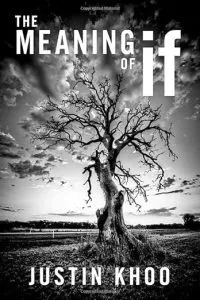 I recently looked at Justin Khoo’s The Meaning of If published last year by OUP. Anyone writing an intro logic book (and I still hanker after a third edition of IFL) wants — or ought to want — to have something sensible to say about the relation of ‘if’ and ‘⊃’, though some do duck the task. So I’m always interested to see what people are writing these days on the topic of conditionals. But I can’t say I got much out of this. One of the phenomena here is that, however ‘if’s work in the wider world, in mathematics regimenting them by a connective ‘⊃’ governed by the usual rules (acceptable to classical logic and constructive logic alike) seems to work a treat, at least once we distinguish plain ‘if’s from the ‘imply’s we regiment using turnstiles. But there isn’t a word about this in Khoo’s book (you look in vain for anything about mathematics, or indeed about “conditional proof”, or “supposition”, and so on). So whatever the virtues of this book — which I confess didn’t impress me — it will probably be of no real interest to logicians.
I recently looked at Justin Khoo’s The Meaning of If published last year by OUP. Anyone writing an intro logic book (and I still hanker after a third edition of IFL) wants — or ought to want — to have something sensible to say about the relation of ‘if’ and ‘⊃’, though some do duck the task. So I’m always interested to see what people are writing these days on the topic of conditionals. But I can’t say I got much out of this. One of the phenomena here is that, however ‘if’s work in the wider world, in mathematics regimenting them by a connective ‘⊃’ governed by the usual rules (acceptable to classical logic and constructive logic alike) seems to work a treat, at least once we distinguish plain ‘if’s from the ‘imply’s we regiment using turnstiles. But there isn’t a word about this in Khoo’s book (you look in vain for anything about mathematics, or indeed about “conditional proof”, or “supposition”, and so on). So whatever the virtues of this book — which I confess didn’t impress me — it will probably be of no real interest to logicians.
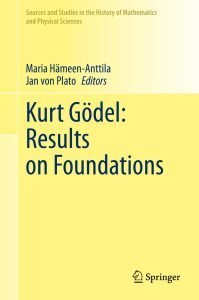 Finally, I’ll quickly mention again another book which I did little more than mention in an earlier blog post. The editors Maria Hämeen-Anttila and Jan von Plato write in their short Preface
Finally, I’ll quickly mention again another book which I did little more than mention in an earlier blog post. The editors Maria Hämeen-Anttila and Jan von Plato write in their short Preface
“If there is one “must” to be cleared in the enormous mass of the Kurt Gödel Papers kept at the Firestone Library of Princeton University, it is the series of four notebooks titled Resultate Grundlagen. Gödel wrote these 368 pages between 1940 and 1942, except for the first 33 and last 12 pages. There is a continuous page numbering and the same goes for the theorems. It has been a great fortune for us to meet the task of transcribing, translating, and editing these notebooks.” So here we have the result, published at a quite extortionate price by Springer, as Kurt Gödel, Results on Foundations. I didn’t get much out of it myself. But the editors announce that Akihiro Kanamori has a forthcoming essay on The remarkable set theory in Gödel’s 1940–42 Resultate Grundlagen, “an essay that explains how Gödel had arrived at numerous results independently discovered by others later, sometimes much later, in an anticipation of the development of set theory from 1942 on, the year Gödel left formal work in logic and foundations”. So maybe I’ll be able to more usefully revisit Gödel’s notebooks with Kanamori as guide in due course.
The post Some logic book notes, 2023 appeared first on Logic Matters.
December 23, 2023
A Christmas card
Angels by Benozzo Gozzoli, from his quite wonderful frescos in the Magi Chapel of the Palazzo Medici-Riccardi.
Who would have thought that the familiar words, “With every good wish for a happy Christmas and a peaceful New Year”, would have taken on such new weight over the last couple of years. Grim times.
So even more than usually, this comes with every good wish for a happy Christmas and a peaceful New Year.
The post A Christmas card appeared first on Logic Matters.
December 21, 2023
András Schiff at 70
András Schiff is seventy today. Here he is a decade ago, playing Bach’s Italian Concerto, with total mastery but also that evident enjoyment which conveys so much to his listeners. Twelve minutes of musical joy!
The post András Schiff at 70 appeared first on Logic Matters.
December 19, 2023
Maddy and Väänänen on categoricity arguments
 There’s a new short book in the Cambridge Elements series — Penelope Maddy and Jouko Väänänen have written a very interesting contribution on Philosophical Uses of Categoricity Arguments. Here’s their Introduction:
There’s a new short book in the Cambridge Elements series — Penelope Maddy and Jouko Väänänen have written a very interesting contribution on Philosophical Uses of Categoricity Arguments. Here’s their Introduction:
Mathematicians and philosophers have appealed to categoricity arguments in a surprisingly varied range of contexts. One familiar example calls on second-order categoricity in an attempt to show that the Continuum Hypothesis, despite its formal independence, has a determinate truth value, but this doesn’t exhaust the uses of categoricity even in set theory, not to mention its appearance in various roles in discussions of arithmetic. Here, we compare and contrast a sampling of these deployments to get a sense of when these arguments tend to succeed and when they tend to fail. Our story begins with two historical landmarks, Dedekind and Zermelo, on arithmetic and set theory, respectively, and ends with leading contemporary writers, Charles Parsons and the coauthors Tim Button and Sean Walsh, again on arithmetic and set theory, respectively. In between, we pause over the well-known contribution of Georg Kreisel. In each case, we ask: What does the author set out to accomplish, philosophically? What do they actually do (or what can be done), mathematically? And does what’s done (or can be done) accomplish what they set out to do? We find this focus on context illuminating: these authors have qualitatively different philosophical goals, and what works for one might not work for another.
Their scorecard? “Dedekind has successfully achieved his goal” (p. 6), and “In the end … Zermelo accomplished more than he set out to do -– and ultimately more than he could have realized at the time – so this application of categoricity arguments must be counted as a resounding success” (p. 15). As for Kreisel, properly read “determinateness of CH wasn’t his target in the first place. At his actual goal – elucidating the independence phenomenon – he succeeds” (p. 21). Next, “In the end, there seems room for doubt that our shared concept [of number], Parsons’s own Hilbertian intuition of the endless sequence of strokes, is as clear and determinate as we think it is. And if there is this room for doubt, formal categoricity theorems don’t seem to be the kind of thing that might conceivably help. Given these open questions, both mathematical and philosophical, Parsons’s appeal to categoricity arguments to establish “the uniqueness of the natural numbers” can’t yet be judged a success.” (p. 38, after a particularly useful discussion.) Finally, “We conclude that Button and Walsh have not succeeded in establishing that internalist … concerns over the status of CH are “difficult to sustain” (p. 49).
Along the way, we get pointers to some significant first-order results due to Väänänen, and the book concludes
Perhaps unsurprisingly, we think the first-order theorems do make an important philosophical point: an outcome that was thought to require secondorder resources – namely, categoricity theorems – can actually be achieved by suitable first-order means. … This is a useful discovery, which supports our general moral: a bit of mathematics that fails at one task might succeed (and even be aimed) at another.
I hope that’s enough to pique your interest in what does seem to be one of the best so far of the logic/philosophy of mathematics Elements; I enjoyed a quick first reading — it is only 50 small pages — and will want to return to think more carefully about some of the interpretations and arguments.
(A minor but welcome point: unlike some earlier Elements, this looks to have been properly LaTeXed so the symbols aren’t garbled.)
This little book should be readily available if your library has a suitable Cambridge Core subscription. And until the end of today the CUP version is freely available for download here. But there is also (as pointed out in a comment below) a version which looks to be more or less identical on the arXiv here.
The post Maddy and Väänänen on categoricity arguments appeared first on Logic Matters.
December 18, 2023
Not Florence …
In latter years, Before Covid, we went to Florence a number of times before Christmas. It is a real delight then, when the city is largely free of other tourists. But it was not to be, this year. So there is only my virtual self, slouching down a deserted backstreet, as conjured up by ChatGPT.
I’ve been writing a bit about categories instead, which is distracting but hardly compensates. But it does mean that now all but the current last chapter of Category Theory II has been updated. It has taken me longer than it should have done, but the newly revised penultimate chapter is (I hope) both tidier and more accurate than it was. You can download the whole current draft here. And who knows? — with just one chapter to go, there might be a complete revised draft by the end of the year. Then I’ll have to think exactly what I’m going to do with it!
The post Not Florence … appeared first on Logic Matters.
December 14, 2023
ChatGPT will lead you astray — but you know that!
There’s no doubt that playing around with ChatGPT 4 can be fun. And the DALL·E image-generating capacities are really rather remarkable. Here I am, sitting in the ruins, as the world seems to be falling apart around me, trying to distract myself with matters categorial.
I’m mighty glad, though, that I am retired from the fray and am not having to cope with students using ChatGPT for good or ill. To be sure, it has its academic uses. For example, a few trials asking it to recommend books on various topic provided quite sensible lists (and it even had the good taste to recommend a certain intro to formal logic … and it doesn’t know who’s asking!). But as for doing your writing for you …
I might be deceiving myself, but in the Cambridge supervision system, where students have to argue about what they have written, week by week, you won’t get away with relying too much on ChatGPT to write your essays. But elsewhere, in places where one-to-one (or one-to-two) teaching-time is nowhere near so generous, how will teachers negotiate the new situation? There’s an interesting and not exactly cheering discussion thread here, most relevant to philosophers, on Daily Nous.
In a different kind of usage, I did try asking ChatGPT some elementary questions in category theory. For example, it is well known that not all Xs are Ys (the details don’t matter): I had a slighty messy example, but am sure it is easy to do better. So I asked for the simplest case of an X which isn’t a Y. And got back a very nicely constructed answer, which set things up very well, explained the notions involved and gave a supposed example that looked superficially plausible. But it was just wrong, though it took me a little while to see it. So I pressed for more detail of why the described X wasn’t a Y. And got back more superficially plausible chat, which I could imagine well taking in a weaker student.
The same again, when I asked ChatGPT to fill in some details of a sketched proof of a well-known categorial result (the sort of place where one might arm-wave in a lecture, and say “we can now easily show ….”). Again its supposed completions had just the right look-and-feel. But were in fact just wrong at key points.
This might be good for teachers — a whole new class of examples to use: “Here is a ChatGPT proof. Is it right? If not where does it go wrong?”. But not so good, perhaps, for mathematics students: somewhat less strong students who aren’t suitably primed are going to repeatedly end up with flatly false beliefs about which alleged proofs really are in good order.
The post ChatGPT will lead you astray — but you know that! appeared first on Logic Matters.
December 10, 2023
(Not just) Schubert on Sunday 7: Elisabeth Brauss and friends
Elisabeth Brauss has recently been in Australia with Noa Wildschut (above), with the two friends playing a dozen concerts to great acclaim in many reviews (such as here). Sadly, none of the performances seems to have been recorded. One day, the recording studio must beckon.
However, another series of concerts by Elisabeth and friends was recorded in the Belfast a month or so back, and four short programmes were broadcast by the BBC this week, and are now available on BBC sounds:
1. Schumann Piano Quintet, and Mozart Quartet no. 1 (with Chaos Quartet)
2. Schubert D.664 and César Franck Cello Sonata (with Leonard Elschenbroich)
3. Schumann Carnaval, Fanny Mendelssohn Quartet in E flat Major (with Chaos Quartet)
4. Brahms, Cello Sonata and Ravel Le tombeau de couperin (with Leonard Elschenbroich)
Elisabeth’s Schubert little A major and the Ravel I heard her play in Cambridge are particularly good. As is this other outstanding performance of hers, also broadcast on the BBC this week:
5. Chopin Scherzo No. 2 in B flat minor (starting about 2hr 8m into the programme)
Enjoy!
The post (Not just) Schubert on Sunday 7: Elisabeth Brauss and friends appeared first on Logic Matters.
December 6, 2023
Adjunctions, at last …
Here I am, sitting in my Piranese-esque library, thinking about category theory. According to ChatGPT. And here is the result of my ruminations, with two newly revised chapters of Category Theory II, a warm-up on Galois connections, and then a first chapter on adjunctions.
The post Adjunctions, at last … appeared first on Logic Matters.
December 2, 2023
The long road to Ludwig (no, not that one …)
 No, not Ludwig Wittgenstein (that brooding and distracting presence for philosophers of my generation … still, I think I’m in recovery).
No, not Ludwig Wittgenstein (that brooding and distracting presence for philosophers of my generation … still, I think I’m in recovery).
But Ludwig van Beethoven.
In the end, every really serious string quartet faces the challenge of recording at least some, if not all, of the Beethoven quartets. The legacy of past recordings is simply stunning, and must be so daunting. Latter day cycles by the Takacs, Belcea and Casals Quartets are more than worthy successors of the legendary greats. More recently still, the wondrous Chiaroscuro Quartet having already recorded the Op. 18 quartets, have just started on later quartets with another terrific CD featuring Opp. 74 and 130.
And now the Doric Quartet, after some particularly outstanding Haydn discs, among other fine recordings, have launched what they plan to be a complete Beethoven cycle, with a CD including some of the quartets they have been playing since students twenty years ago. I have found it absolutely compelling over the last week or so. Their performances are far too good for me to want to try to make amateurish comparative judgements; I’m being just swept along in the moment while repeatedly listening (exactly as you should be). The playing in some of the slow movements, in particular, is surely as good as it gets: heart-stopping.
Really warmly recommended, then.
The post The long road to Ludwig (no, not that one …) appeared first on Logic Matters.

